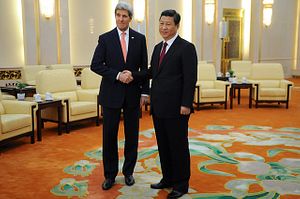At this point, therefore, Washington has three choices:
1) Continue to press its allies not to join the AIIB until governance procedures for the bank are assured;
2) Join the AIIB itself; or
3) Drop the issue.
Option one is clearly a losing proposition. There is no sense expending further political capital trying to persuade regional and other actors not to join the bank. It is a small-potato issue that is making the United States look weak at a time when U.S. influence in the region is otherwise quite strong.
Option two, which I—along with virtually every other China analyst outside the U.S. government—supported back in October is that the United States join the AIIB. There are several reasons why this is a good idea. It would allow the United States a seat inside the tent where it could be both a positive force for best governance practices and an internal critic if things go awry. It also would likely help ensure that U.S. companies have fair access to the bidding opportunities that will arise from the AIIB’s investment financing. Joining now will be hard to accomplish in a face-saving manner, but the United States could begin by publicly recognizing the need for the financing capabilities in Asia that the AIIB can provide and by moving quickly to work with Australia, South Korea, and Japan to work out common principles of accession.
Option three is for the United States to back away from the AIIB, release other countries from any pressure they might feel from the United States not to join, and let the AIIB rise or fall on its own merits. Chinese-led resource and infrastructure investment has encountered significant difficulty in a number of countries, including Zambia, Myanmar, Vietnam, Brazil, and Sri Lanka, among others. If the AIIB does not do a better job than China’s own development banks, it will be a stain not only on Beijing but also on all the other countries that are participating. If it does operate at the same standard as the World Bank and Asian Development Bank, then it will be a welcome addition to the world of development financing. The United States does not have to be in every regional organization in the Asia Pacific; it is not in the Shanghai Cooperation Organization, for example, and it is only an observer in the Conference on Interactions and Confidence-Building Measures in Asia. It can sit out the AIIB or assume observer status as well.
Washington’s priority should be on advancing U.S. ideals and institutions through the pivot or rebalance rather than blocking Chinese initiatives unless absolutely necessary. (Let’s not confuse China’s effort to develop the AIIB with its push to implement an Air Defense Identification Zone, for example.) Opposition to the Asian Infrastructure Investment Bank has become a millstone around Washington’s neck. It is time to remove it one way or another.
Elizabeth C. Economy is C.V. Starr Senior Fellow and Director for Asia Studies at the Council on Foreign Relations. She is an expert on Chinese domestic and foreign policy and U.S.-China relations and author of the award-winning book, The River Runs Black: The Environmental Challenge to China’s Future. This post appears courtesy of CFR.org and Forbes Asia.

































